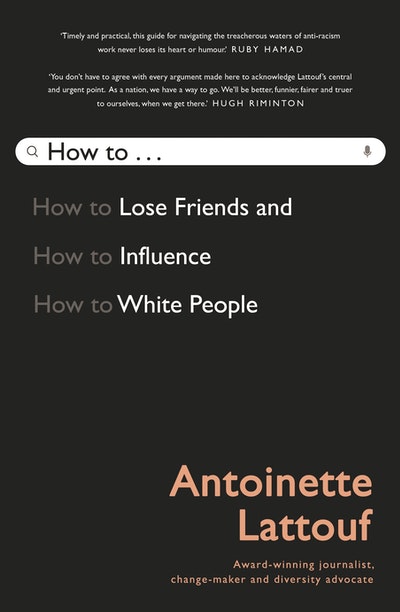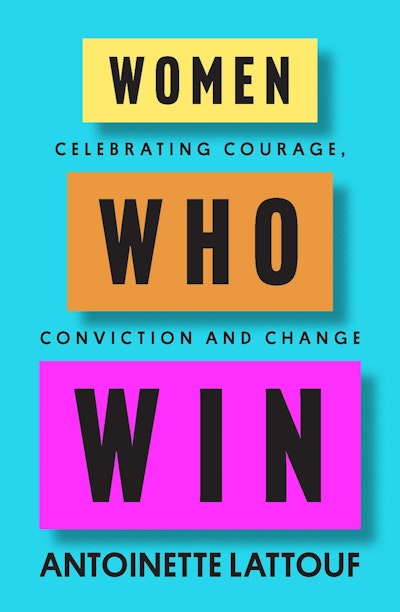- Published: 3 May 2022
- ISBN: 9781761044007
- Imprint: Vintage Australia
- Format: Trade Paperback
- Pages: 288
- RRP: $34.99
How to Lose Friends and Influence White People
- Published: 3 May 2022
- ISBN: 9781761044007
- Imprint: Vintage Australia
- Format: Trade Paperback
- Pages: 288
- RRP: $34.99
Timely and practical, this guide for navigating the treacherous waters of anti-racism work never loses its heart or humour.
Ruby Hamad
This is arms in the air, squeal in delight reading! Anyone who’s felt the scourge of discrimination is vindicated by the home truths delivered page after page. Antoinette fearlessly uses lived experience, real time Australian examples, expert opinion & irrefutable research to deliver tools for change.
Narelda Jacobs
It’s a searing, witty, meticulously crafted manual to anti-racism, feminism, advocacy, power, relationships and individual responsibility.
Rafqa Touma, The Guardian
How to Lose Friends and Influence White People is a must-read for every Australian. Antoinette Lattouf explores structural racism from every angle using robust data, clever analogies, and a generous dollop of humour. It’s well and truly time for some critical self-reflection about “pale, stale, male … and Gayle” and “White supremacy in heels”. This book works well on several levels, offering a step-by-step guide for advocates and easy-to-understand calls to action for potential allies. True to Lattouf’s character, the book doesn’t shy away from vexed issues like lateral violence. Ultimately, the author outlines solutions to these deep-seated problems, ending on a note of optimism and hope for the future. This is a tour de force!”
Tracey Spicer
Giving an ironic twist to the self-help classic How to Win Friends and Influence People, Lattouf offers savvy and hard-earned advice on how all of us can play a part in challenging and dismantling the systems and assumptions scaffolding white privilege. Real change starts, she argues, with self-education, especially on the part of whites, and with the understanding that it “won’t always be easy or comfortable”. A valuable roadmap for venturing beyond our comfort zones, as individuals and as a society.
Fiona Capp, The Sydney Morning Herald
It's a witty, conversational book that doesnt seek to be purely didactic but to evoke empathy and ask questions around power structures in Australia, especially in an unrepresentative media.
Wenlei Ma, news.com.au
How to Lose Friends and Influence White People is a fascinating read, full of information, advice, and advocacy. It is undoubtedly eye-opening, even for those of us who see ourselves as very liberal-minded. Lattouf writes with passion, verve, charm, humour, and above all authenticity.
Tracey Korsten, Glam Adelaide
In this funny and poignant self-help book, Lattouf won’t advise you to “criticise, condemn or complain” like Dale Carnegie’s How To Win Friends And Influence People. Instead, she explores the searing fallout into why you should not do that.
Pedestrian
How To Lose Friends And Influence White People asserts that change and freedom has never been handed out on a silver platter — they’ve always been hard-fought for, and has a price. There are so many barriers to having vital, meaningful, and productive discussions about race — people ignore concrete facts, shut down, or refuse to face their privilege — but Lattouf’s book offers ideas on how to have these dialogues productively.
Millie Roberts, Junkee
In his 1966 classic “The Tyranny of Distance”, historian Geoffrey Blainey details what Gideon Haigh has described as a “staunch and oblivious Anglocentricity.” The White Australia policy is long gone. We live, we’re constantly told, in “the most successful multicultural nation on earth.” We desperately want to believe it. But Antoinette Lattouf argues little has changed since Blainey penned his most famous work. Power and influence in Australia are overwhelmingly held by people who are white. Indeed, she argues, there is a sliding scale of skin colour. The darker you are, the more distant you are from power and the more likely you are to suffer racism even from other “people of colour” further up the chain - the “off-whites” including Lattouf herself, who is of Lebanese heritage. Lattouf is the co-founder of Media Diversity Australia, which has the narrow but vitally important focus of pressing for newsrooms to reflect the diversity of the communities they serve. I can attest to her success in changing thinking though there is a legacy effect and still far to go. Full disclosure: in its early days I was the token white guy on the MDA’s advisory board. This book is bracing, confronting, data rich but cheerfully accessible. The arguments are real and its time is now. Beyond its obvious purpose, it is a witty guide to effective activism. Lattouf is merciless with the usual suspects in the male, pale, stale patriarchy - myself included - but hardly less so with the “prosecco-flavoured progressives” of middle class white feminism. Racism in her own Australianised Arab community also gets a searching examination. She is particularly compelling on the way that women of colour who offend the mainstream are mercilessly dealt with, forced into silence, their careers destroyed. You don’t have to agree with every argument made here to acknowledge Lattouf’s central and urgent point. As a nation, we have a way to go. We’ll be better, funnier, fairer and truer to ourselves, when we get there.
Hugh Riminton
This is a very good book for anyone interested in race, diversity, inclusion and how not to be a massive knob.
Jan Fran
This should be mandatory reading for all.
Bob Moore, Good Reading Magazine







